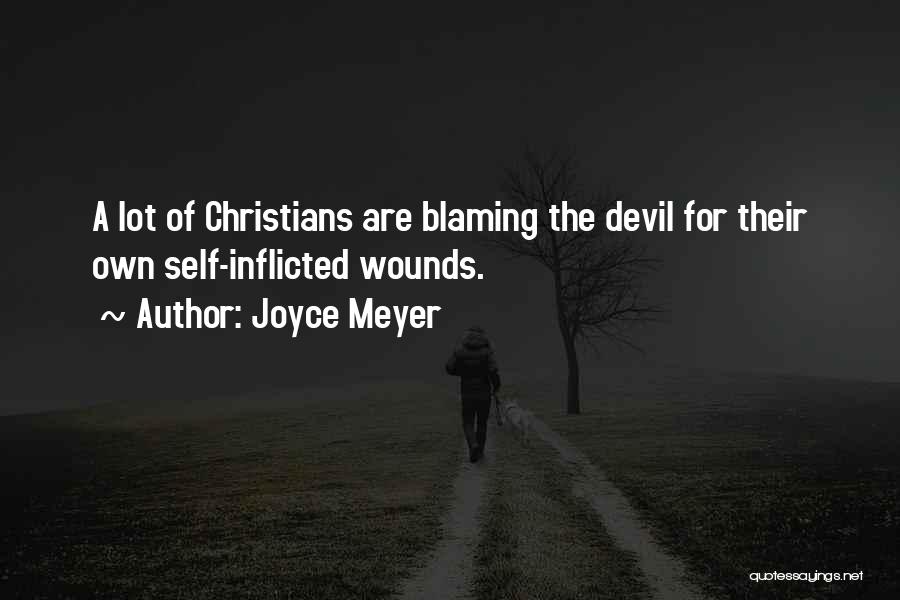Quotes & Sayings About Blaming Self
Enjoy reading and share 48 famous quotes about Blaming Self with everyone.
Top Blaming Self Quotes
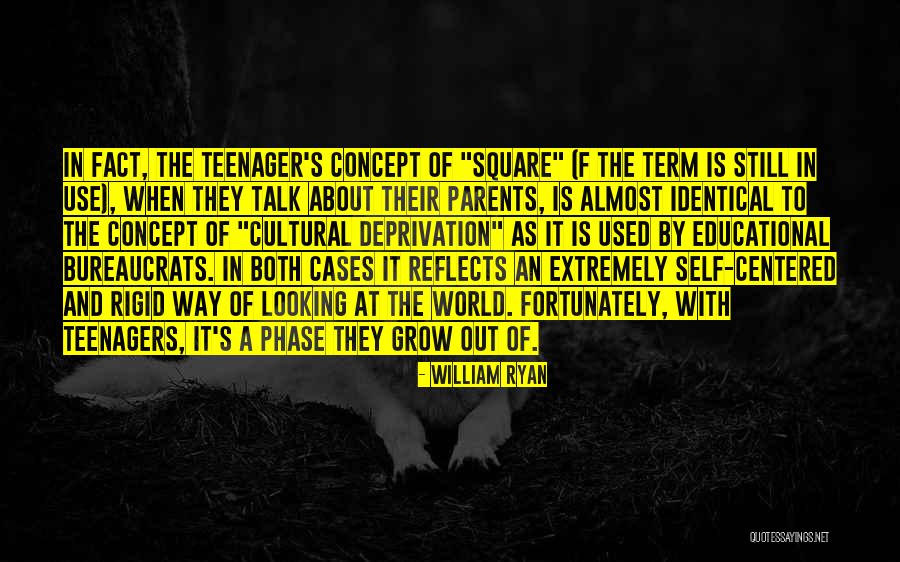
In fact, the teenager's concept of "square" (f the term is still in use), when they talk about their parents, is almost identical to the concept of "cultural deprivation" as it is used by educational bureaucrats. In both cases it reflects an extremely self-centered and rigid way of looking at the world. Fortunately, with teenagers, it's a phase they grow out of. — William Ryan
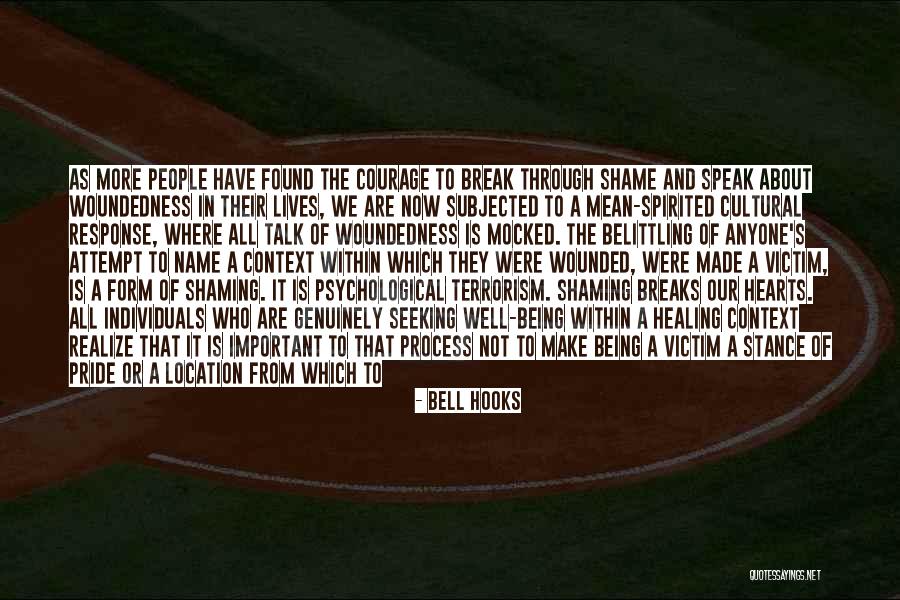
As more people have found the courage to break through shame and speak about woundedness in their lives, we are now subjected to a mean-spirited cultural response, where all talk of woundedness is mocked. The belittling of anyone's attempt to name a context within which they were wounded, were made a victim, is a form of shaming. It is psychological terrorism. Shaming breaks our hearts. All individuals who are genuinely seeking well-being within a healing context realize that it is important to that process not to make being a victim a stance of pride or a location from which to simply blame others. We need to speak our shame and our pain courageously in order to recover. Addressing woundedness is not about blaming others; however, it does allow individuals who have been, and are, hurt to insist on accountability and responsibility both from themselves and from those who were the agents of their suffering as well as those who bore witness. Constructive confrontation aids our healing. — Bell Hooks
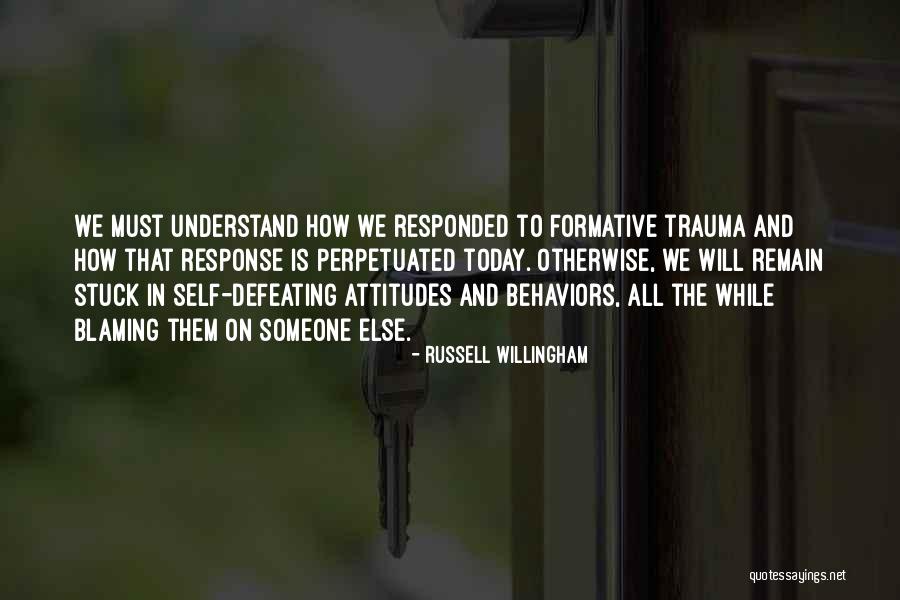
We must understand how we responded to formative trauma and how that response is perpetuated today. Otherwise, we will remain stuck in self-defeating attitudes and behaviors, all the while blaming them on someone else. — Russell Willingham
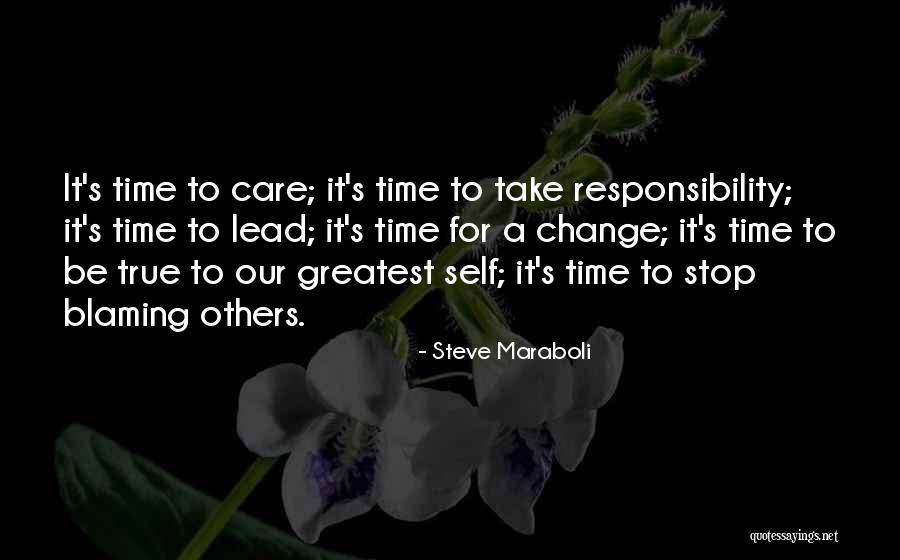
It's time to care; it's time to take responsibility; it's time to lead; it's time for a change; it's time to be true to our greatest self; it's time to stop blaming others. — Steve Maraboli
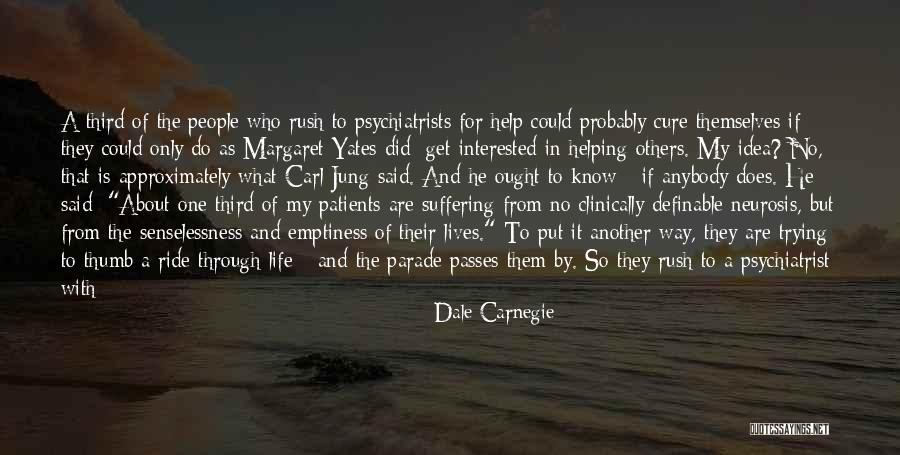
A third of the people who rush to psychiatrists for help could probably cure themselves if they could only do as Margaret Yates did: get interested in helping others. My idea? No, that is approximately what Carl Jung said. And he ought to know - if anybody does. He said: "About one third of my patients are suffering from no clinically definable neurosis, but from the senselessness and emptiness of their lives." To put it another way, they are trying to thumb a ride through life - and the parade passes them by. So they rush to a psychiatrist with their petty, senseless, useless lives. Having missed the boat, they stand on the wharf, blaming everyone except themselves and demanding that the world cater to their self-centered desires. — Dale Carnegie
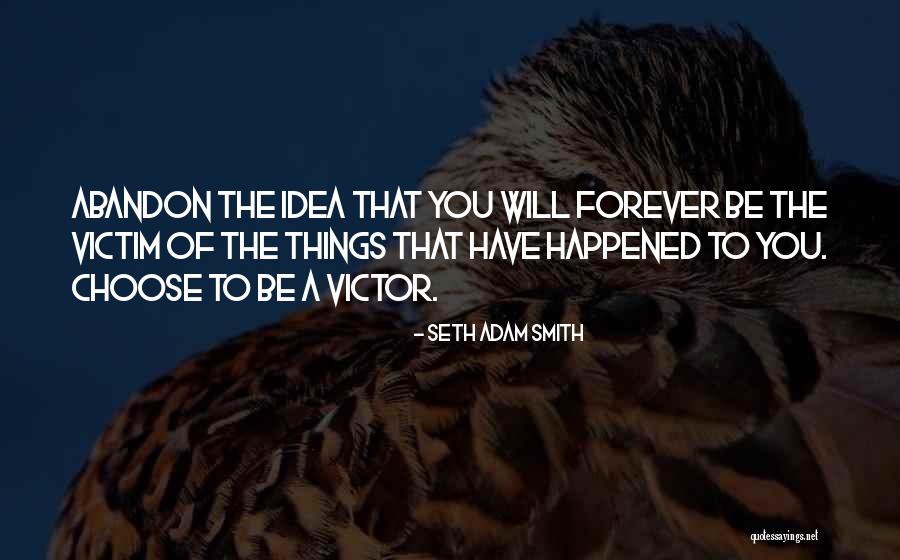
Abandon the idea that you will forever be the victim of the things that have happened to you. Choose to be a victor. — Seth Adam Smith
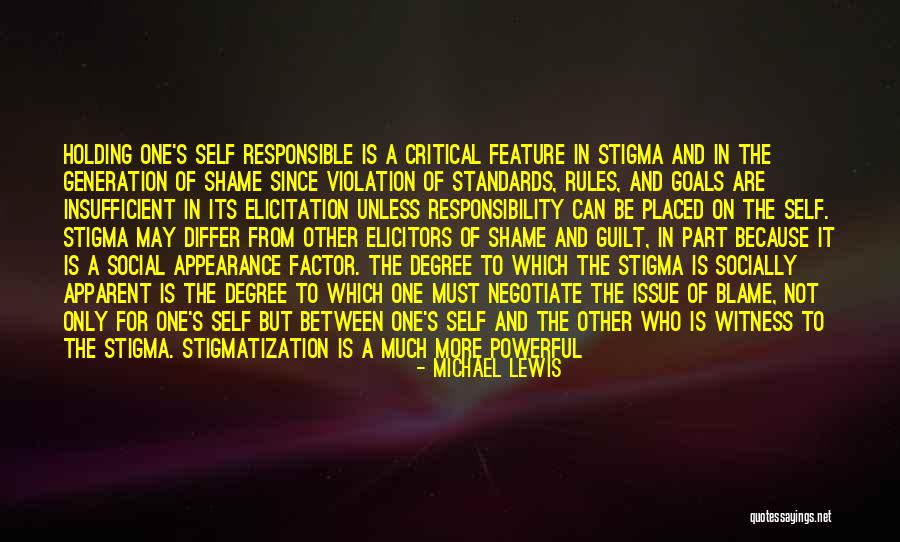
Holding one's self responsible is a critical feature in stigma and in the generation of shame since violation of standards, rules, and goals are insufficient in its elicitation unless responsibility can be placed on the self. Stigma may differ from other elicitors of shame and guilt, in part because it is a social appearance factor. The degree to which the stigma is socially apparent is the degree to which one must negotiate the issue of blame, not only for one's self but between one's self and the other who is witness to the stigma. Stigmatization is a much more powerful elicitor of shame and guilt in that it requires a negotiation not only between one's self and one's attributions, but between one's self and the attributions of others. — Michael Lewis
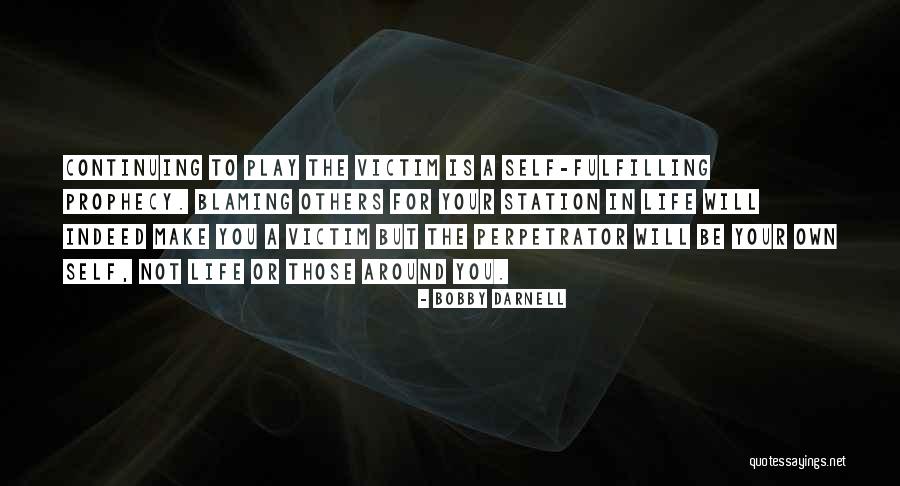
Continuing to play the victim is a self-fulfilling prophecy. Blaming others for your station in life will indeed make you a victim but the perpetrator will be your own self, not life or those around you. — Bobby Darnell
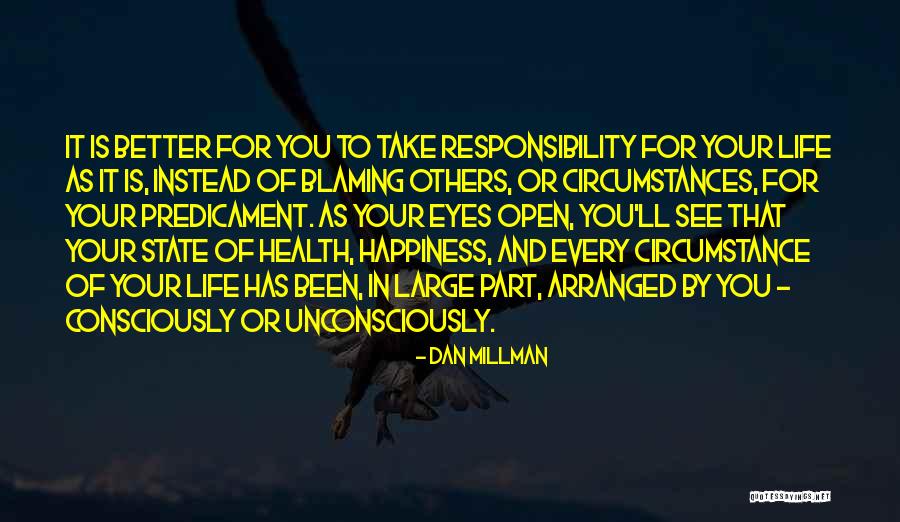
It is better for you to take responsibility for your life as it is, instead of blaming others, or circumstances, for your predicament. As your eyes open, you'll see that your state of health, happiness, and every circumstance of your life has been, in large part, arranged by you - consciously or unconsciously. — Dan Millman
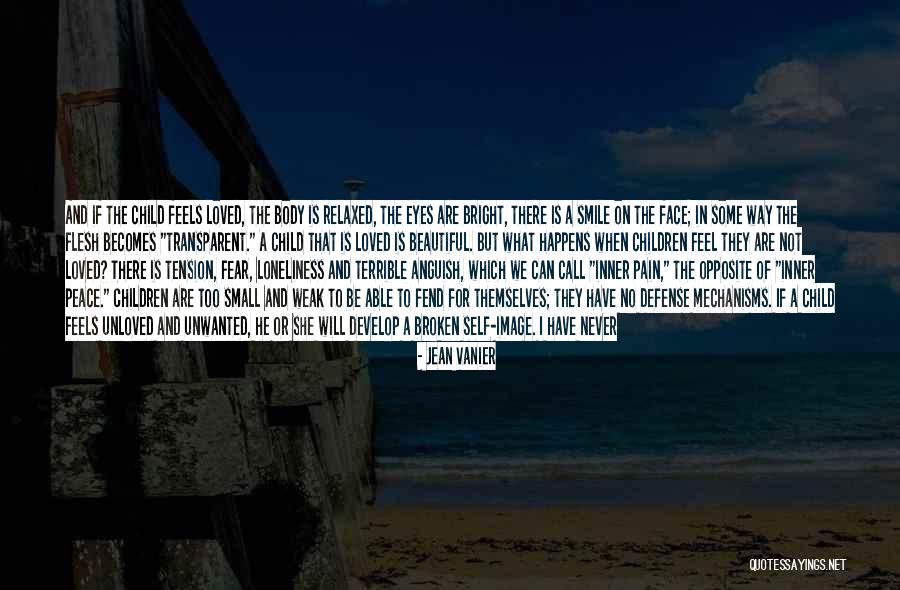
And if the child feels loved, the body is relaxed, the eyes are bright, there is a smile on the face; in some way the flesh becomes "transparent." A child that is loved is beautiful. But what happens when children feel they are not loved? There is tension, fear, loneliness and terrible anguish, which we can call "inner pain," the opposite of "inner peace." Children are too small and weak to be able to fend for themselves; they have no defense mechanisms. If a child feels unloved and unwanted, he or she will develop a broken self-image. I have never heard any of the men or women whom we have welcomed into our community criticize their parents, even though many of them have suffered a great deal from rejection or abandonment in their families. Rather than blaming their parents, they blame themselves. "If I am not loved, it is because I am not lovable, I am no good. I am evil. — Jean Vanier
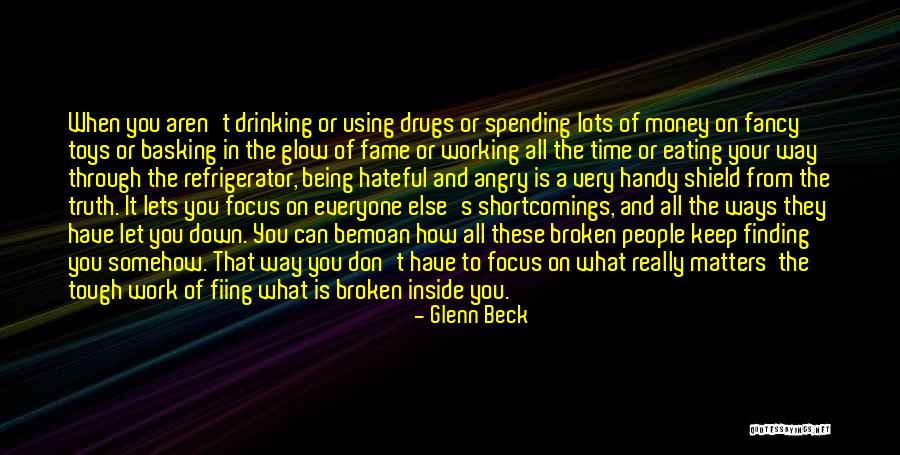
When you aren't drinking or using drugs or spending lots of money on fancy toys or basking in the glow of fame or working all the time or eating your way through the refrigerator, being hateful and angry is a very handy shield from the truth. It lets you focus on everyone else's shortcomings, and all the ways they have let you down. You can bemoan how all these broken people keep finding you somehow. That way you don't have to focus on what really matters
the tough work of fiing what is broken inside you. — Glenn Beck
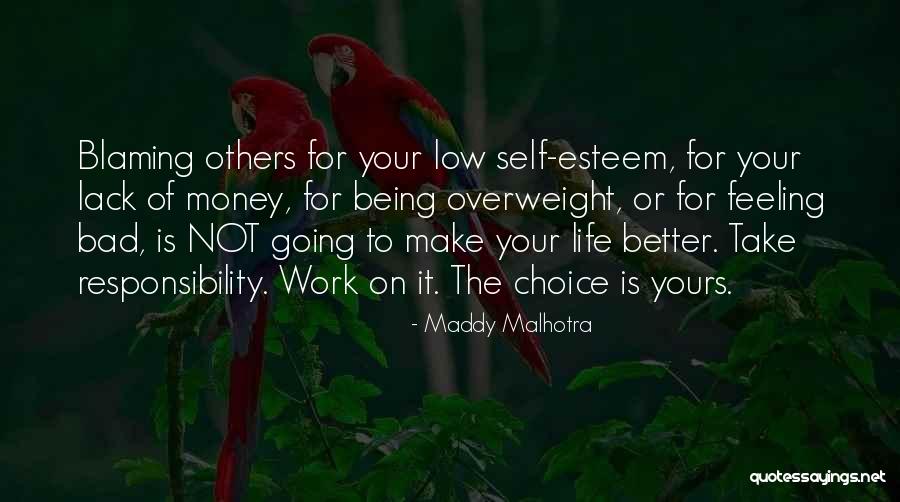
Blaming others for your low self-esteem, for your lack of money, for being overweight, or for feeling bad, is NOT going to make your life better. Take responsibility. Work on it. The choice is yours. — Maddy Malhotra
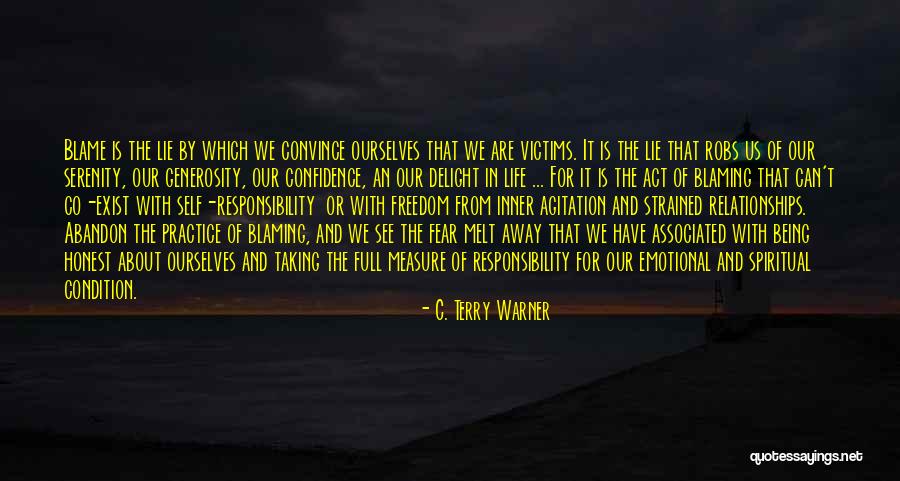
Blame is the lie by which we convince ourselves that we are victims. It is the lie that robs us of our serenity, our generosity, our confidence, an our delight in life ... For it is the act of blaming that can't co-exist with self-responsibility
or with freedom from inner agitation and strained relationships. Abandon the practice of blaming, and we see the fear melt away that we have associated with being honest about ourselves and taking the full measure of responsibility for our emotional and spiritual condition. — C. Terry Warner
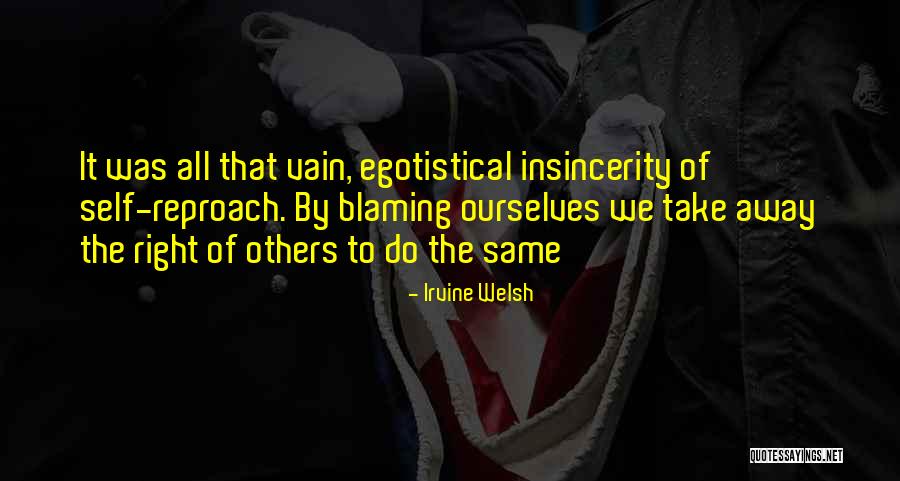
It was all that vain, egotistical insincerity of self-reproach. By blaming ourselves we take away the right of others to do the same — Irvine Welsh
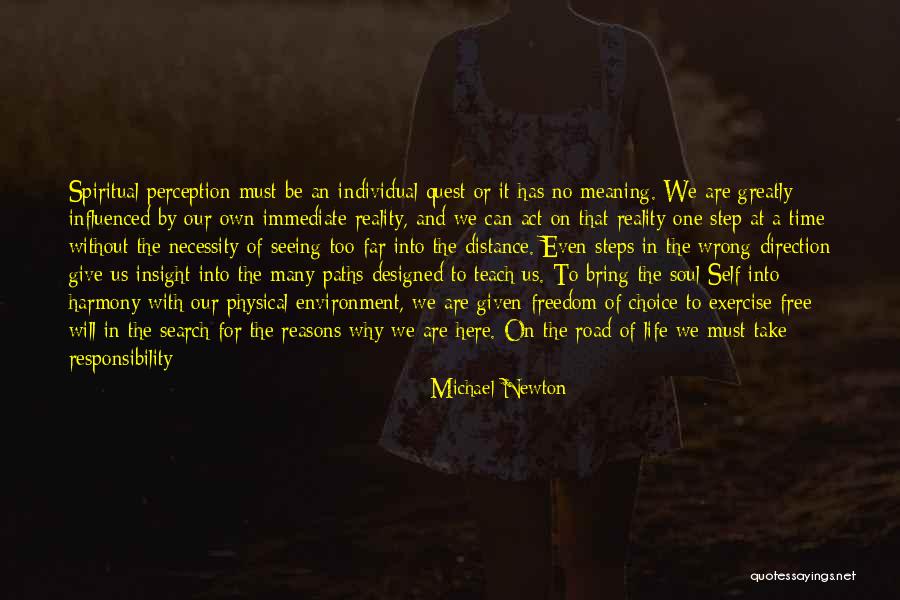
Spiritual perception must be an individual quest or it has no meaning. We are greatly influenced by our own immediate reality, and we can act on that reality one step at a time without the necessity of seeing too far into the distance. Even steps in the wrong direction give us insight into the many paths designed to teach us. To bring the soul Self into harmony with our physical environment, we are given freedom of choice to exercise free will in the search for the reasons why we are here. On the road of life we must take responsibility for all our decisions without blaming other people for life's setbacks that bring unhappiness. — Michael Newton
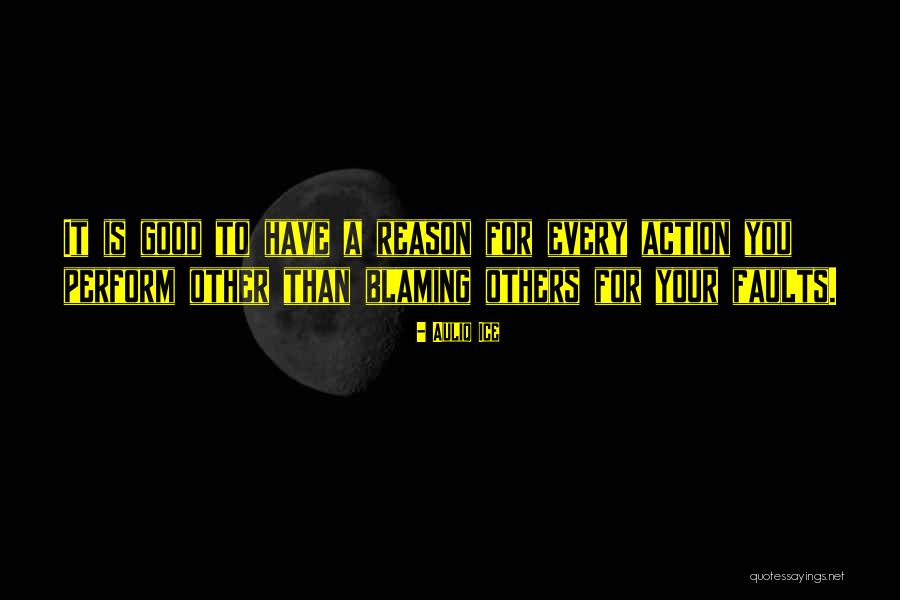
It is good to have a reason for every action you perform other than blaming others for your faults. — Auliq Ice
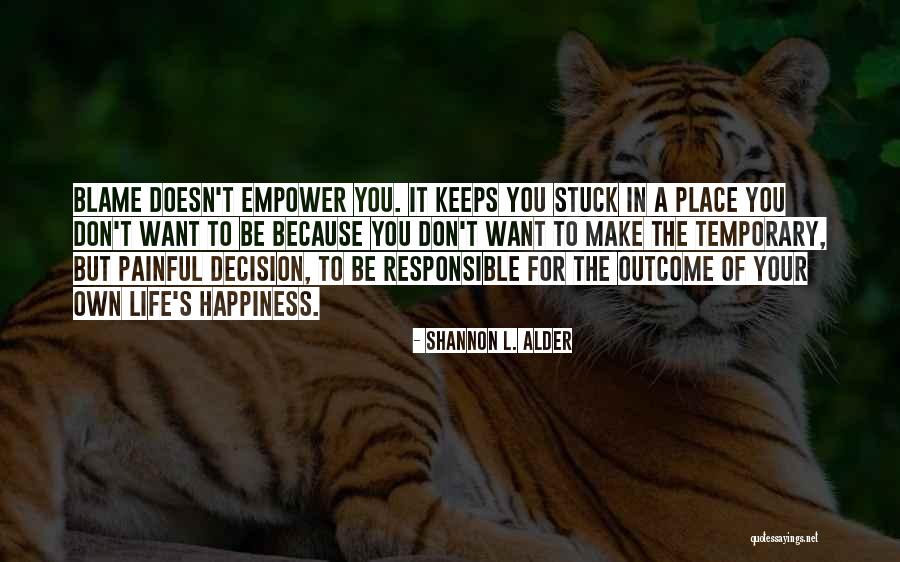
Blame doesn't empower you. It keeps you stuck in a place you don't want to be because you don't want to make the temporary, but painful decision, to be responsible for the outcome of your own life's happiness. — Shannon L. Alder
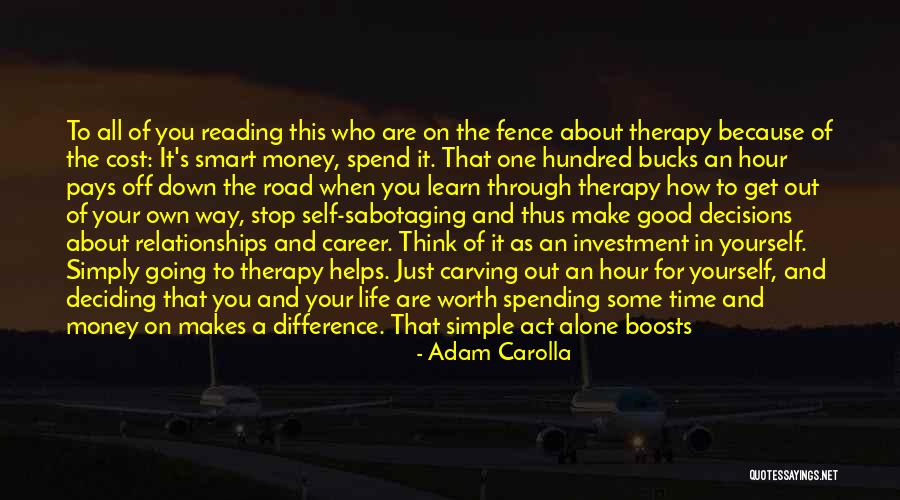
To all of you reading this who are on the fence about therapy because of the cost: It's smart money, spend it. That one hundred bucks an hour pays off down the road when you learn through therapy how to get out of your own way, stop self-sabotaging and thus make good decisions about relationships and career. Think of it as an investment in yourself. Simply going to therapy helps. Just carving out an hour for yourself, and deciding that you and your life are worth spending some time and money on makes a difference. That simple act alone boosts your self-esteem. Don't think of going to therapy as "I'm a broken pile of crap and need someone to fix me," think of it as "I'm going to change myself for the better instead of crying, masturbating and blaming my parents for the rest of my life. — Adam Carolla
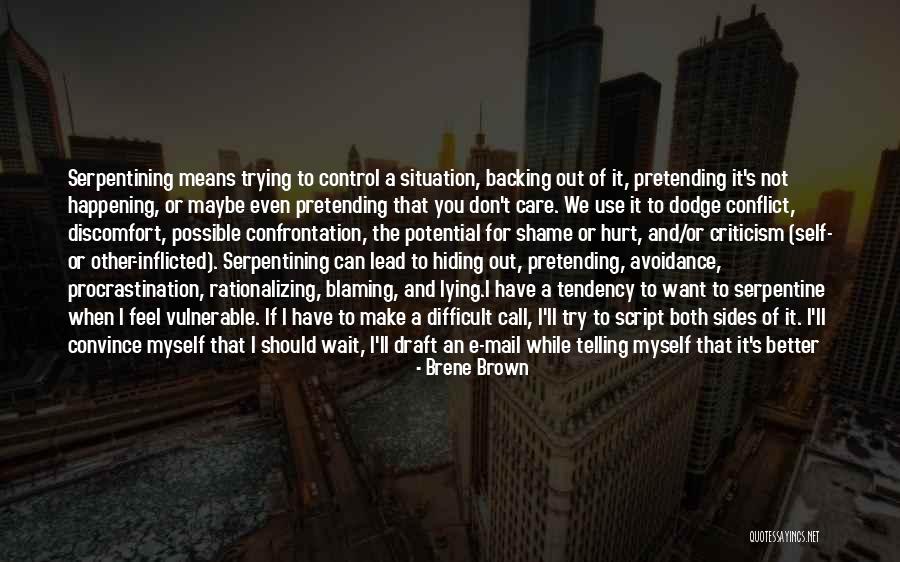
Serpentining means trying to control a situation, backing out of it, pretending it's not happening, or maybe even pretending that you don't care. We use it to dodge conflict, discomfort, possible confrontation, the potential for shame or hurt, and/or criticism (self- or other-inflicted). Serpentining can lead to hiding out, pretending, avoidance, procrastination, rationalizing, blaming, and lying.
I have a tendency to want to serpentine when I feel vulnerable. If I have to make a difficult call, I'll try to script both sides of it. I'll convince myself that I should wait, I'll draft an e-mail while telling myself that it's better in writing, and I'll think of a million other things to do. I'll emotionally run back and forth until I'm exhausted. — Brene Brown
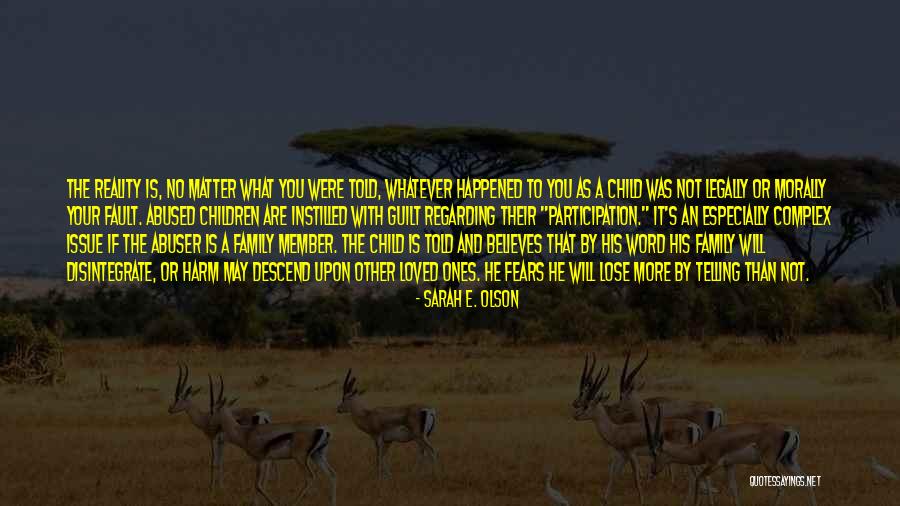
The reality is, no matter what you were told, whatever happened to you as a child was not legally or morally your fault. Abused children are instilled with guilt regarding their "participation." It's an especially complex issue if the abuser is a family member. The child is told and believes that by his word his family will disintegrate, or harm may descend upon other loved ones. He fears he will lose more by telling than not. — Sarah E. Olson
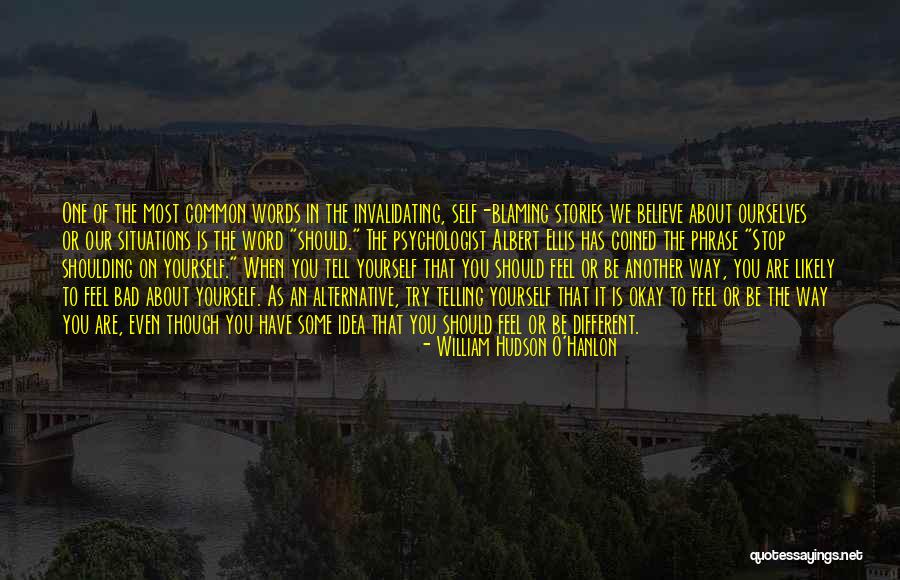
One of the most common words in the invalidating, self-blaming stories we believe about ourselves or our situations is the word "should." The psychologist Albert Ellis has coined the phrase "Stop shoulding on yourself." When you tell yourself that you should feel or be another way, you are likely to feel bad about yourself. As an alternative, try telling yourself that it is okay to feel or be the way you are, even though you have some idea that you should feel or be different. — William Hudson O'Hanlon
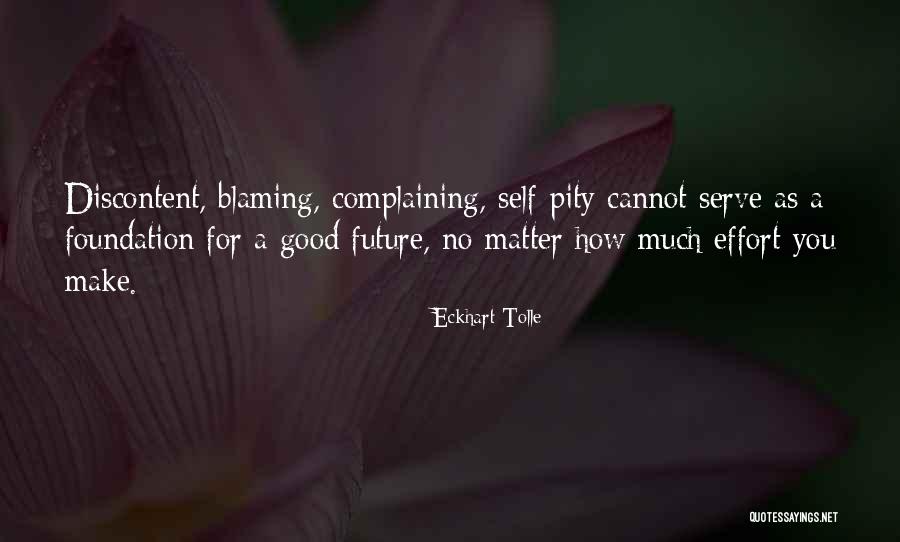
Discontent, blaming, complaining, self-pity cannot serve as a foundation for a good future, no matter how much effort you make. — Eckhart Tolle
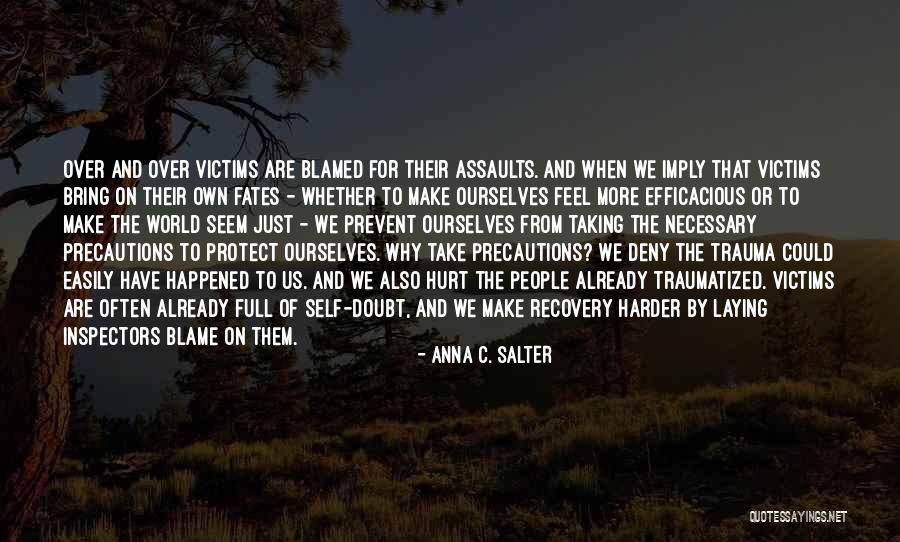
Over and over victims are blamed for their assaults. and when we imply that victims bring on their own fates - whether to make ourselves feel more efficacious or to make the world seem just - we prevent ourselves from taking the necessary precautions to protect ourselves. Why take precautions? We deny the trauma could easily have happened to us. And we also hurt the people already traumatized. Victims are often already full of self-doubt, and we make recovery harder by laying inspectors blame on them. — Anna C. Salter
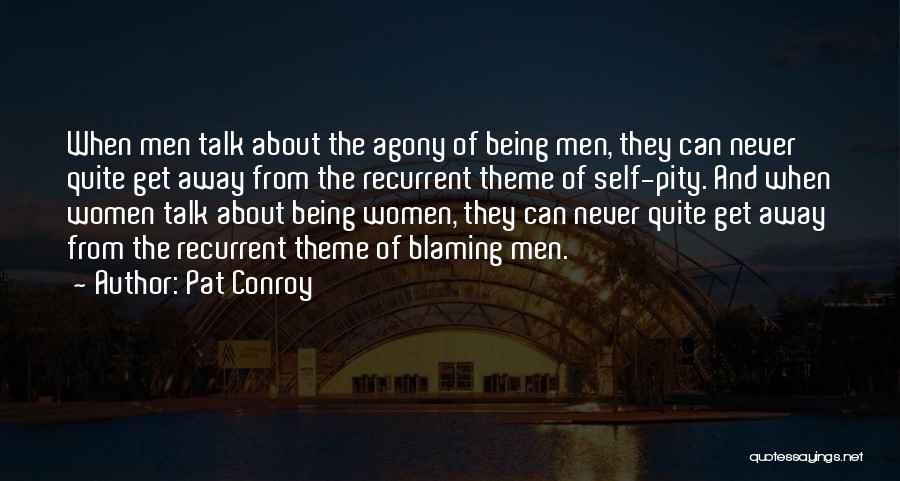
When men talk about the agony of being men, they can never quite get away from the recurrent theme of self-pity. And when women talk about being women, they can never quite get away from the recurrent theme of blaming men. — Pat Conroy
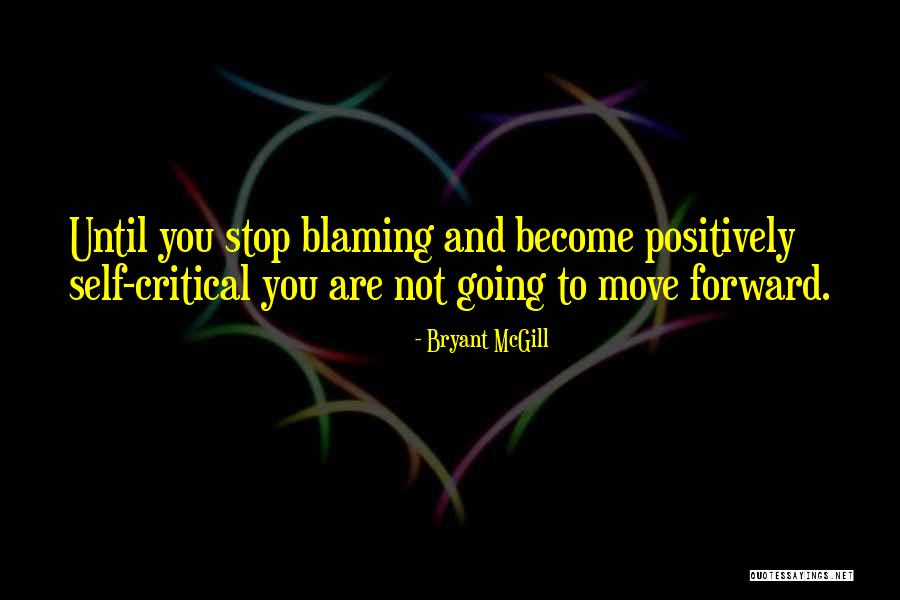
Until you stop blaming and become positively self-critical you are not going to move forward. — Bryant McGill
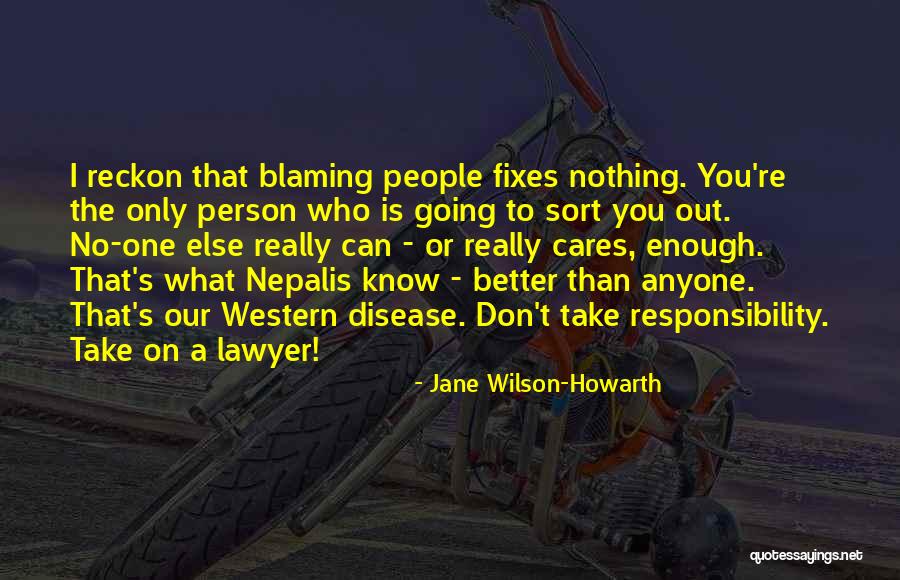
I reckon that blaming people fixes nothing. You're the only person who is going to sort you out. No-one else really can - or really cares, enough. That's what Nepalis know - better than anyone. That's our Western disease. Don't take responsibility. Take on a lawyer! — Jane Wilson-Howarth
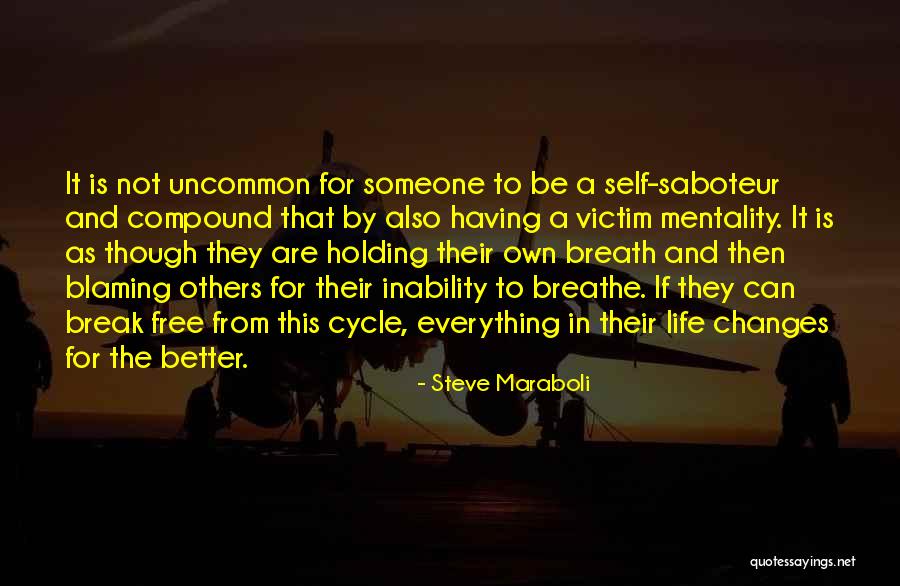
It is not uncommon for someone to be a self-saboteur and compound that by also having a victim mentality. It is as though they are holding their own breath and then blaming others for their inability to breathe. If they can break free from this cycle, everything in their life changes for the better. — Steve Maraboli
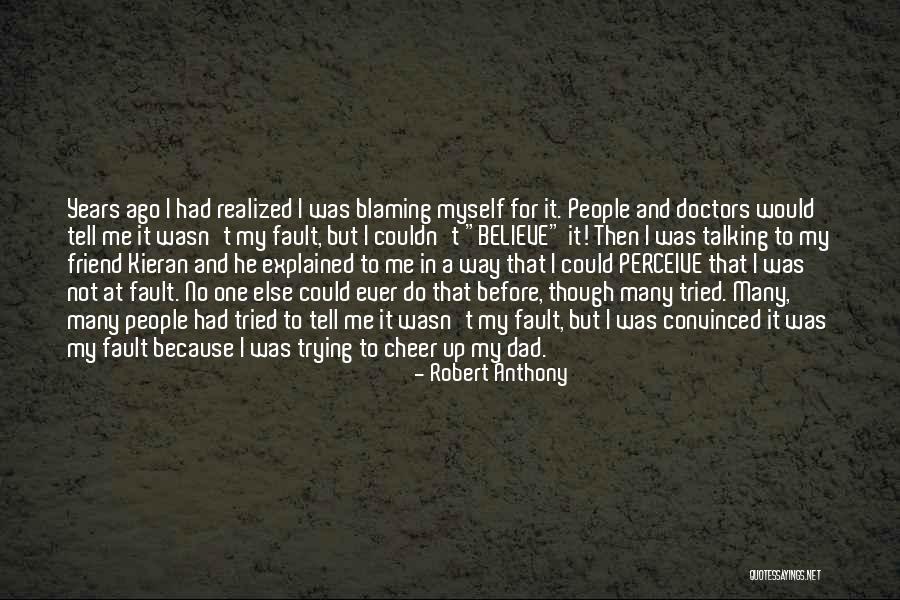
Years ago I had realized I was blaming myself for it. People and doctors would tell me it wasn't my fault, but I couldn't "BELIEVE" it! Then I was talking to my friend Kieran and he explained to me in a way that I could PERCEIVE that I was not at fault. No one else could ever do that before, though many tried. Many, many people had tried to tell me it wasn't my fault, but I was convinced it was my fault because I was trying to cheer up my dad. — Robert Anthony
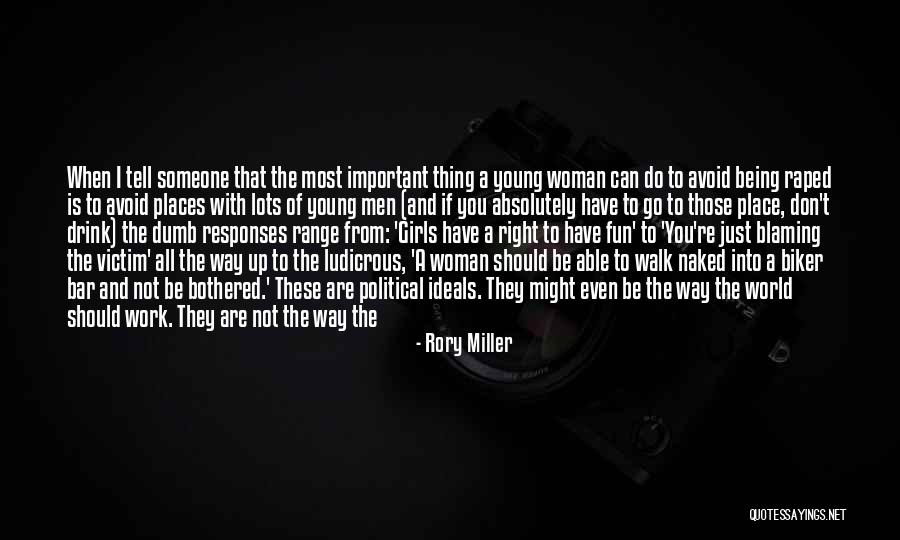
When I tell someone that the most important thing a young woman can do to avoid being raped is to avoid places with lots of young men (and if you absolutely have to go to those place, don't drink) the dumb responses range from: 'Girls have a right to have fun' to 'You're just blaming the victim' all the way up to the ludicrous, 'A woman should be able to walk naked into a biker bar and not be bothered.' These are political ideals. They might even be the way the world should work. They are not the way the world actually works. The responsibility for self-protection has to rest with the potential victim because the potential rapist has no interest whatsoever in her safety or rights. The potential victim is the one who cares. — Rory Miller
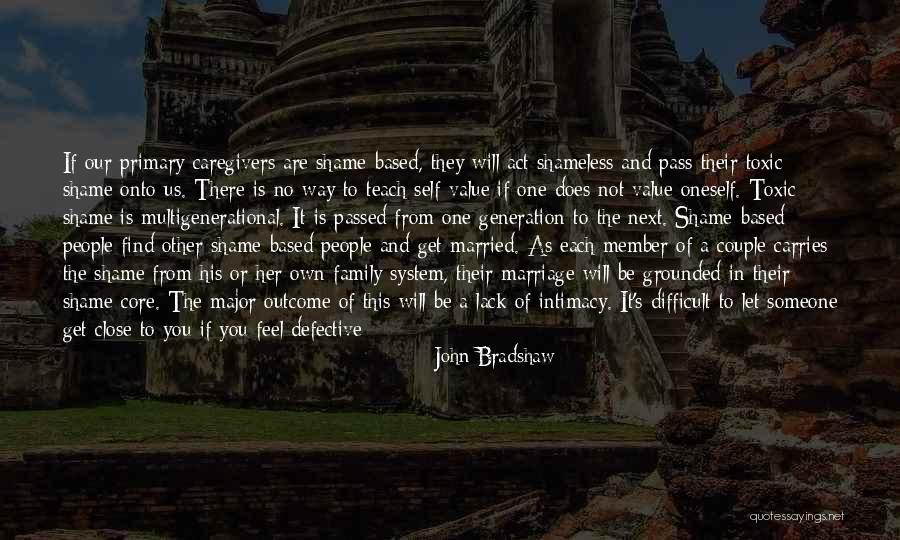
If our primary caregivers are shame-based, they will act shameless and pass their toxic shame onto us. There is no way to teach self-value if one does not value oneself. Toxic shame is multigenerational. It is passed from one generation to the next. Shame-based people find other shame-based people and get married. As each member of a couple carries the shame from his or her own family system, their marriage will be grounded in their shame-core. The major outcome of this will be a lack of intimacy. It's difficult to let someone get close to you if you feel defective and flawed as a human being. Shame-based couples maintain nonintimacy through poor communication, nonproductive circular fighting, games, manipulation, vying for control, withdrawal, blaming and confluence. Confluence is the agreement never to disagree. Confluence creates pseudointimacy. — John Bradshaw
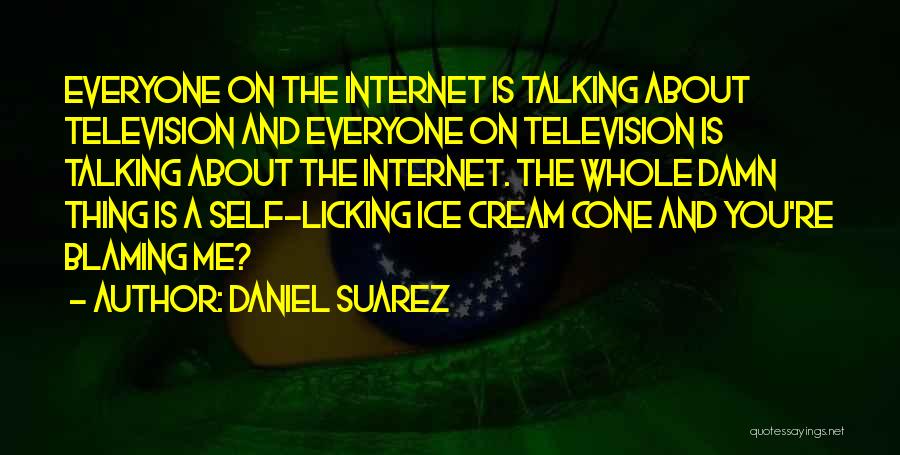
Everyone on the Internet is talking about television and everyone on television is talking about the Internet. The whole damn thing is a self-licking ice cream cone and you're blaming me? — Daniel Suarez
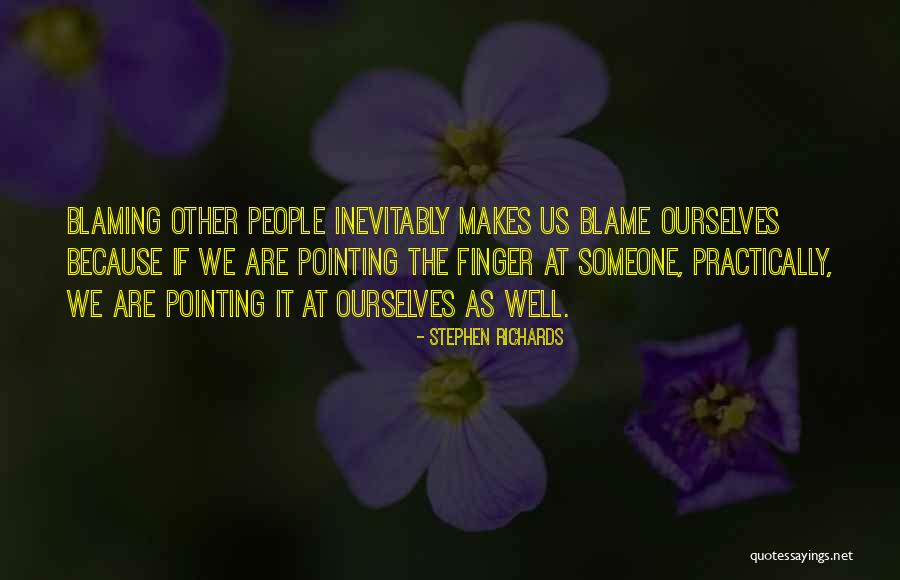
Blaming other people inevitably makes us blame ourselves because if we are pointing the finger at someone, practically, we are pointing it at ourselves as well. — Stephen Richards
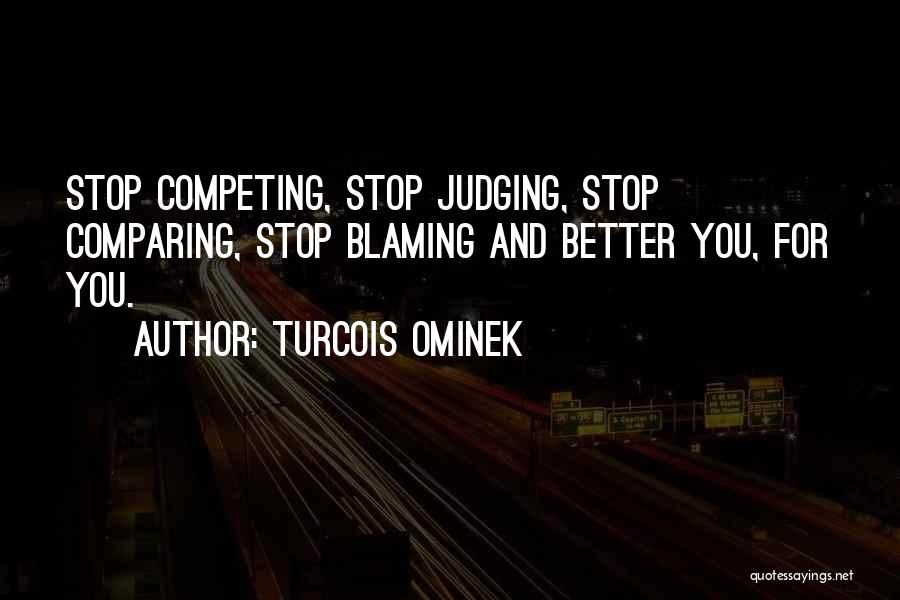
Stop competing, stop judging, stop comparing, stop blaming and better you, for you. — Turcois Ominek
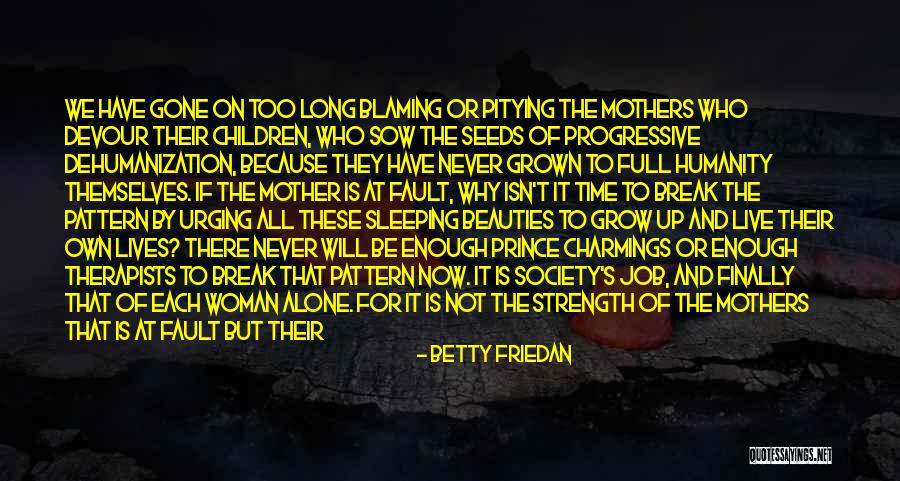
We have gone on too long blaming or pitying the mothers who devour their children, who sow the seeds of progressive dehumanization, because they have never grown to full humanity themselves. If the mother is at fault, why isn't it time to break the pattern by urging all these Sleeping Beauties to grow up and live their own lives? There never will be enough Prince Charmings or enough therapists to break that pattern now. It is society's job, and finally that of each woman alone. For it is not the strength of the mothers that is at fault but their weakness, their passive childlike dependency and immaturity that is mistaken for "femininity." Our society forces boys, insofar as it can, to grow up, to endure the pains of growth, to educate themselves to work, to move on. Why aren't girls forced to grow up - to achieve somehow the core of self that will end the unnecessary dilemma, the mistaken choice between femaleness and humanness that is implied in the feminine mystique? — Betty Friedan
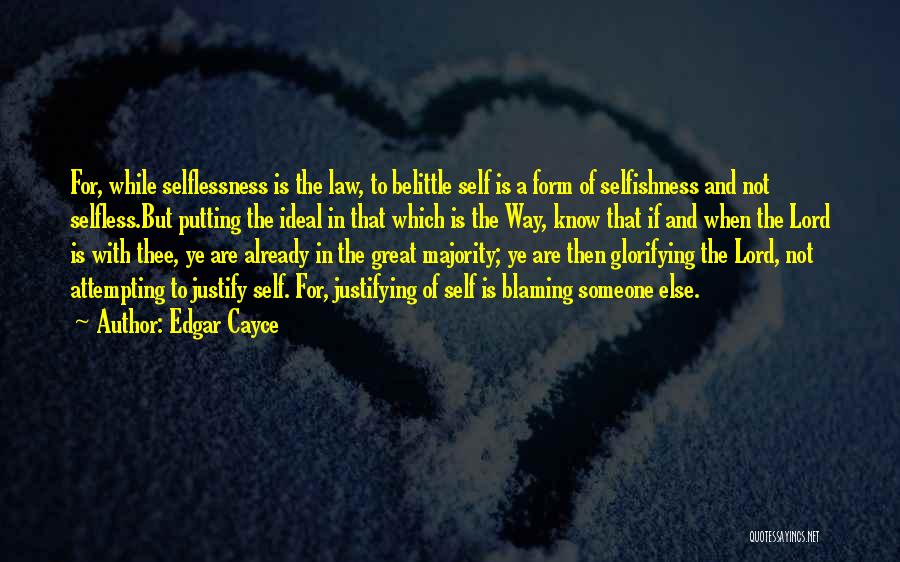
For, while selflessness is the law, to belittle self is a form of selfishness and not selfless.
But putting the ideal in that which is the Way, know that if and when the Lord is with thee, ye are already in the great majority; ye are then glorifying the Lord, not attempting to justify self. For, justifying of self is blaming someone else. — Edgar Cayce
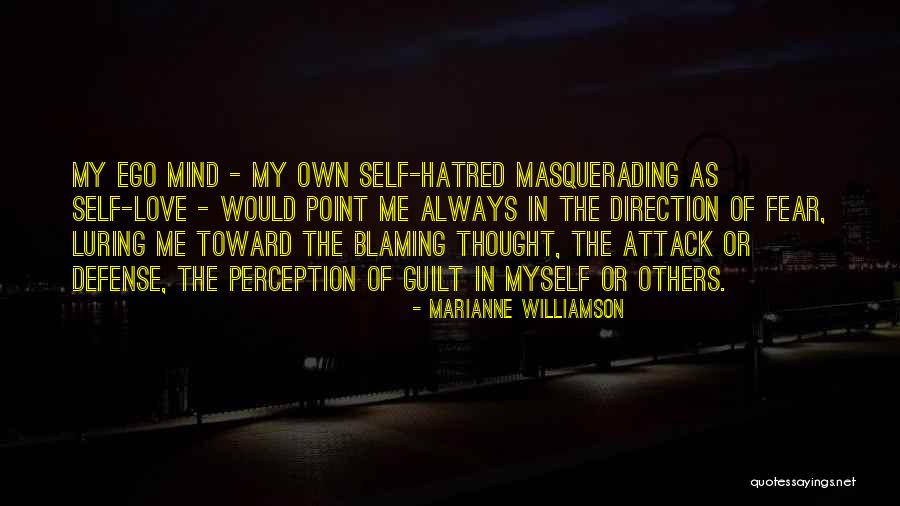
My ego mind - my own self-hatred masquerading as self-love - would point me always in the direction of fear, luring me toward the blaming thought, the attack or defense, the perception of guilt in myself or others. — Marianne Williamson
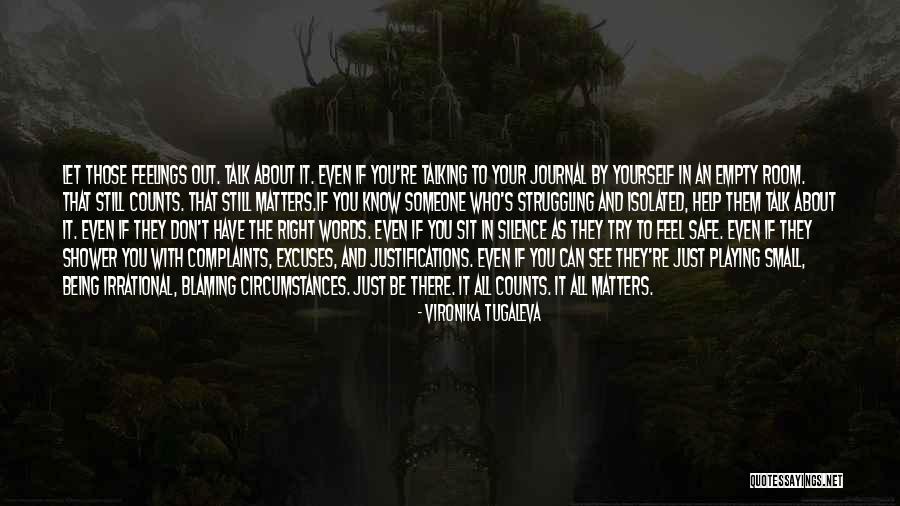
Let those feelings out. Talk about it. Even if you're talking to your journal by yourself in an empty room. That still counts. That still matters.
If you know someone who's struggling and isolated, help them talk about it. Even if they don't have the right words. Even if you sit in silence as they try to feel safe. Even if they shower you with complaints, excuses, and justifications. Even if you can see they're just playing small, being irrational, blaming circumstances. Just be there. It all counts. It all matters. — Vironika Tugaleva
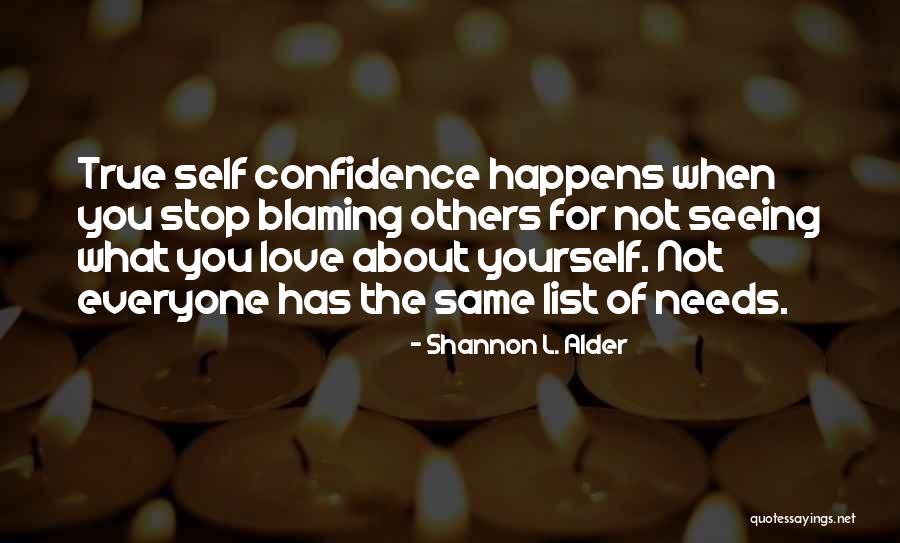
True self confidence happens when you stop blaming others for not seeing what you love about yourself. Not everyone has the same list of needs. — Shannon L. Alder
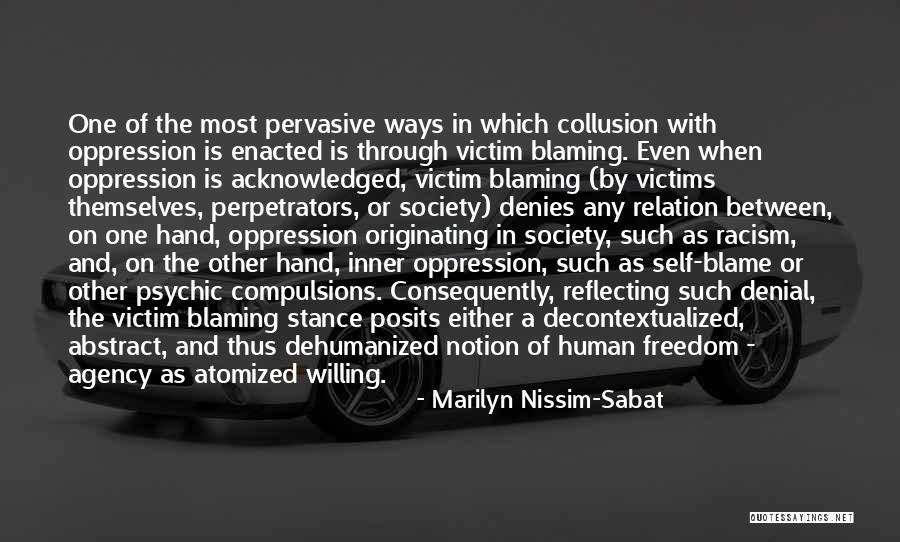
One of the most pervasive ways in which collusion with oppression is enacted is through victim blaming. Even when oppression is acknowledged, victim blaming (by victims themselves, perpetrators, or society) denies any relation between, on one hand, oppression originating in society, such as racism, and, on the other hand, inner oppression, such as self-blame or other psychic compulsions. Consequently, reflecting such denial, the victim blaming stance posits either a decontextualized, abstract, and thus dehumanized notion of human freedom - agency as atomized willing. — Marilyn Nissim-Sabat
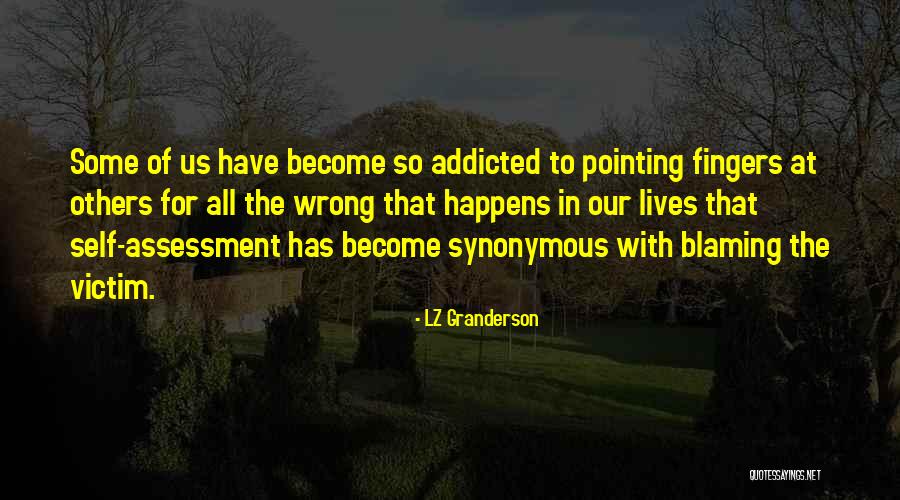
Some of us have become so addicted to pointing fingers at others for all the wrong that happens in our lives that self-assessment has become synonymous with blaming the victim. — LZ Granderson
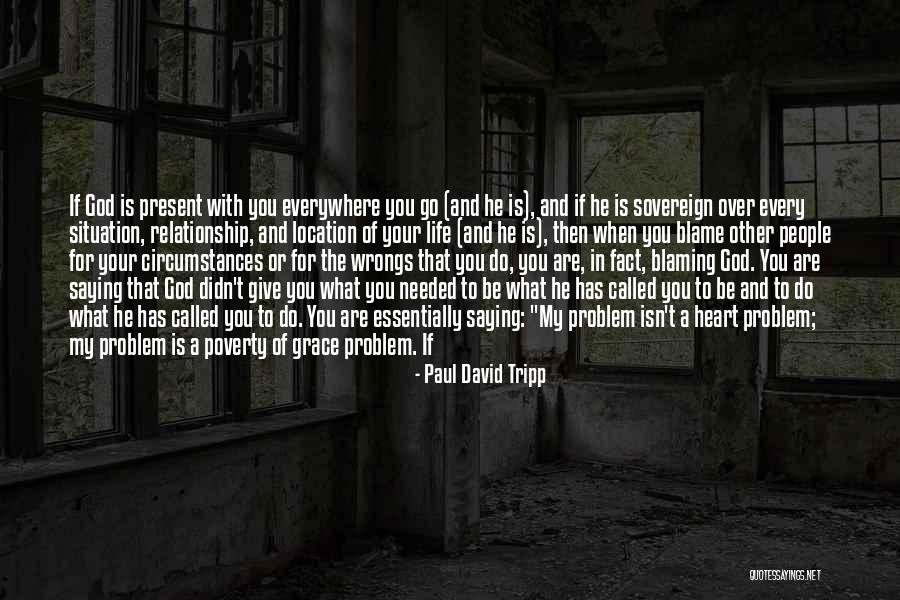
If God is present with you everywhere you go (and he is), and if he is sovereign over every situation, relationship, and location of your life (and he is), then when you blame other people for your circumstances or for the wrongs that you do, you are, in fact, blaming God. You are saying that God didn't give you what you needed to be what he has called you to be and to do what he has called you to do. You are essentially saying: "My problem isn't a heart problem; my problem is a poverty of grace problem. If only God had given me _, I wouldn't have had to do what I did." This is the final argument of a self-excusing lifestyle. This argument was first made in the garden of Eden after the rebellion of Adam and Eve. Adam: "The woman you gave me made me do it." Eve: "The Devil made me do it." It is the age-old self-defensive lie of a person who doesn't want to face the ugliness of the sin that still resides in his or her heart. — Paul David Tripp
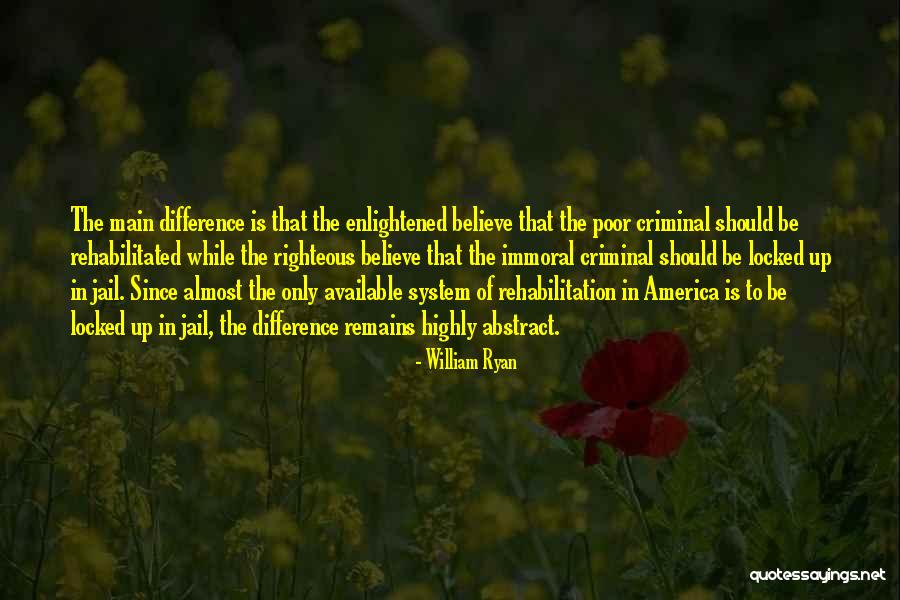
The main difference is that the enlightened believe that the poor criminal should be rehabilitated while the righteous believe that the immoral criminal should be locked up in jail. Since almost the only available system of rehabilitation in America is to be locked up in jail, the difference remains highly abstract. — William Ryan
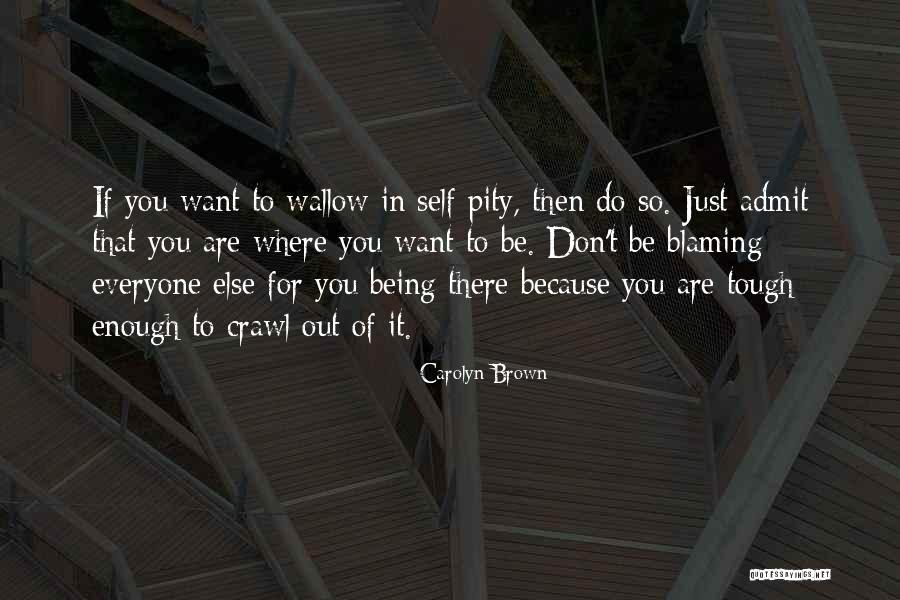
If you want to wallow in self pity, then do so. Just admit that you are where you want to be. Don't be blaming everyone else for you being there because you are tough enough to crawl out of it. — Carolyn Brown
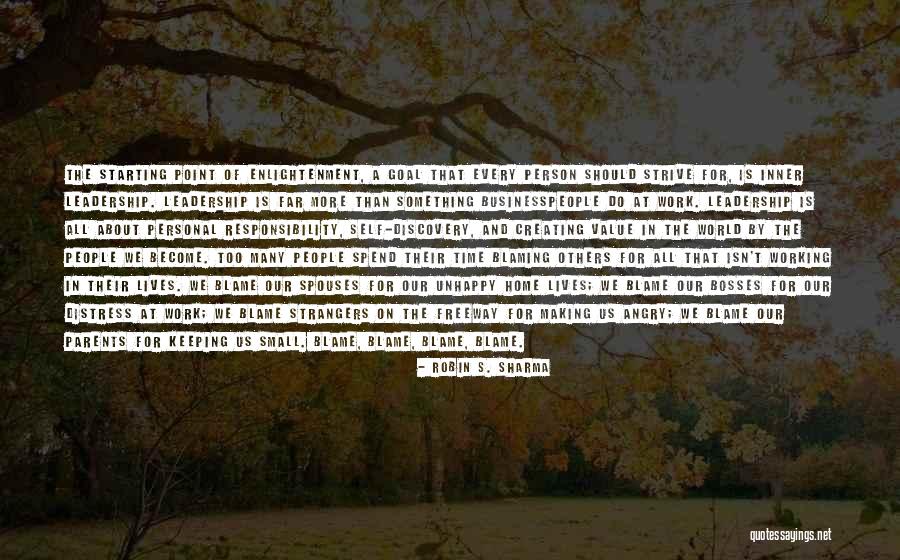
The starting point of enlightenment, a goal that every person should strive for, is inner leadership. Leadership is far more than something businesspeople do at work. Leadership is all about personal responsibility, self-discovery, and creating value in the world by the people we become. Too many people spend their time blaming others for all that isn't working in their lives. We blame our spouses for our unhappy home lives; we blame our bosses for our distress at work; we blame strangers on the freeway for making us angry; we blame our parents for keeping us small. Blame, blame, blame, blame. But blaming others is nothing more than excusing yourself. Blaming others for the current quality of your life is a sad way to live. In doing so, all you're doing is playing the victim. — Robin S. Sharma
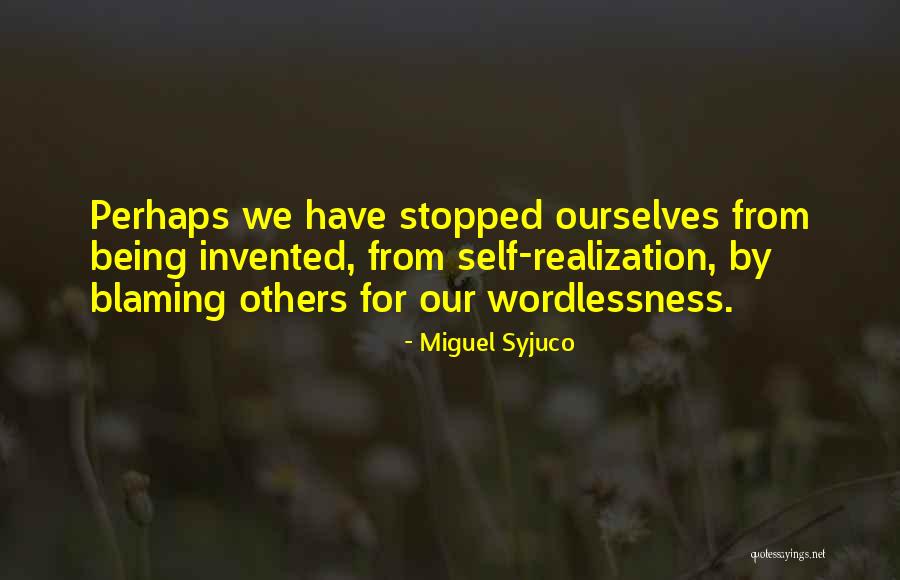
Perhaps we have stopped ourselves from being invented, from self-realization, by blaming others for our wordlessness. — Miguel Syjuco
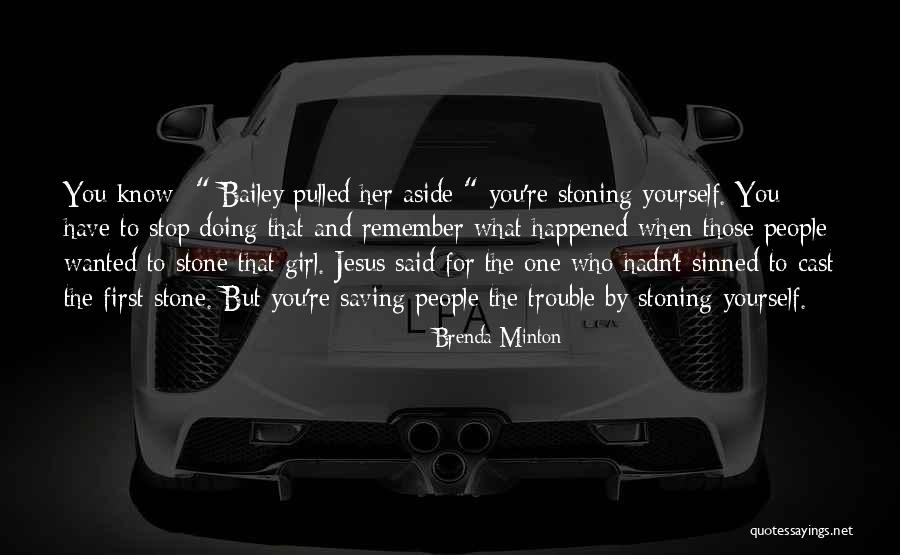
You know -" Bailey pulled her aside "-you're stoning yourself. You have to stop doing that and remember what happened when those people wanted to stone that girl. Jesus said for the one who hadn't sinned to cast the first stone. But you're saving people the trouble by stoning yourself. — Brenda Minton
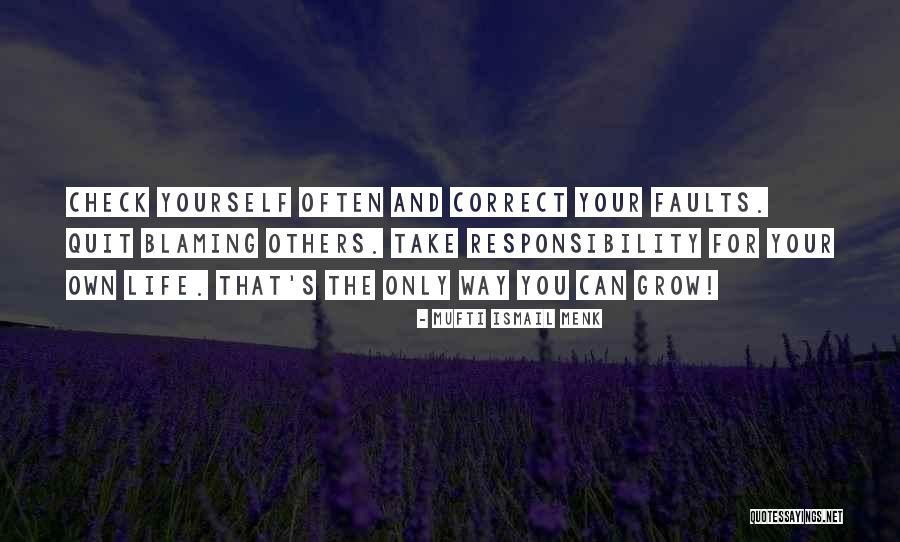
Check yourself often and correct your faults. Quit blaming others. Take responsibility for your own life. That's the only way you can grow! — Mufti Ismail Menk






